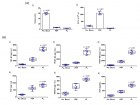Abstract
Research Article
Rida Herbal Bitters Improve Cardiovascular Function in High-fat Diet/Streptozotocin-induced Diabetic Rats
Folasade Omobolanle Ajao*, Damilola Ayodeji Balogun, Marcus Olaoy Iyedupe, Ayobami Olagunju, Esther Oparinde, Luqman Adeniji and Victor Abulude and Funmilayo Elizabeth Olaleye
Published: 28 February, 2024 | Volume 9 - Issue 1 | Pages: 044-051
Background: Effective medication to manage diabetes mellitus-related organ complications with minimal adverse drug toxicity is still in pursuit by scientists worldwide. This study investigated the cardio-protective of Rida herbal bitter (RHB) in a high-fat diet/streptozotocin (STZ)-induced diabetic rats.
Methods: Thirty-two matured male Wistar rats (250 ± 20g) were used. The animals were fed with high-fat diet (HFD) for 6 weeks before diabetes induction. A single dose of (35 mg/kgb.wt) freshly prepared STZ was injected intraperitoneally to induce diabetes. The animals were allocated into four groups, 8rats/group. Group I: control; Group II: HFD/STZ-induced diabetic rats; Groups III & IV: HFD/STZ-induced diabetic rats treated with 0.3 ml RHB & 200 mg/kgb.wt metformin respectively. At the end of the experiment, the animals were sacrificed, blood was sample collected via cardiac puncture and the heart was excised and homogenized. The blood samples and cardiac homogenates tissue were centrifuged to retrieve clear supernatant plasma for biochemical assay.
Results: Diabetic rats exhibited significant (p < 0.05) elevated blood glucose, insulin, glycated hemoglobin (HbA1c), cardiac biomarkers, lipid profile, malondialdehyde (MDA), pro-inflammatory cytokines, food, and water intake levels with a reduction in body weight, cardiac antioxidant activity, and total protein. RHB administration significantly (p < 0.05) diminished the blood glucose, insulin, HbA1c, cardiac biomarkers, MDA, pro-inflammatory cytokines, lipid profile, food, and water intake, and improved the body weight cardiac antioxidant activity, and total protein.
Conclusion: Rida herbal bitter possesses a cardio-protective effect from this study and could be a better alternative medication for managing diabetes and its related cardiovascular complications.
Read Full Article HTML DOI: 10.29328/journal.jccm.1001177 Cite this Article Read Full Article PDF
Keywords:
Ridal herbal bitter; Diabetes mellitus; Cardiac biomarkers; Oxidative stress; Inflammation
References
- Zimmet P, Alberti KG, Magliano DJ, Bennett PH. Diabetes mellitus statistics on prevalence and mortality: facts and fallacies. Nat Rev Endocrinol. 2016 Oct;12(10):616-22. doi: 10.1038/nrendo.2016.105. Epub 2016 Jul 8. PMID: 27388988.
- International Diabetes Federation. IDF diabetes atlas. 10th ed.Brussels. 2021. https://www.diabetesatlas.org.
- Eizirik DL, Pasquali L, Cnop M. Pancreatic β-cells in type 1 and type 2 diabetes mellitus: different pathways to failure. Nat Rev Endocrinol. 2020 Jul;16(7):349-362. doi: 10.1038/s41574-020-0355-7. Epub 2020 May 12. PMID: 32398822.
- World Health Organization. Classification of Diabetes Mellitus. Geneva. 2019:5–7.
- Giri B, Dey S, Das T, Sarkar M, Banerjee J, Dash SK. Chronic hyperglycemia mediated physiological alteration and metabolic distortion leads to organ dysfunction, infection, cancer progression and other pathophysiological consequences: An update on glucose toxicity. Biomed Pharmacother. 2018 Nov;107:306-328. doi: 10.1016/j.biopha.2018.07.157. Epub 2018 Aug 8. PMID: 30098549.
- Murtaza G, Virk HUH, Khalid M, Lavie CJ, Ventura H, Mukherjee D, Ramu V, Bhogal S, Kumar G, Shanmugasundaram M, Paul TK. Diabetic cardiomyopathy - A comprehensive updated review. Prog Cardiovasc Dis. 2019 Jul-Aug;62(4):315-326. doi: 10.1016/j.pcad.2019.03.003. Epub 2019 Mar 25. PMID: 30922976.
- Glovaci D, Fan W, Wong ND. Epidemiology of Diabetes Mellitus and Cardiovascular Disease. Curr Cardiol Rep. 2019 Mar 4;21(4):21. doi: 10.1007/s11886-019-1107-y. PMID: 30828746.
- Elkhalifa AEO, Al-Shammari E, Adnan M, Alcantara JC, Mehmood K, Eltoum NE, Awadelkareem AM, Khan MA, Ashraf SA. Development and Characterization of Novel Biopolymer Derived from Abelmoschus esculentus Extract and Its Antidiabetic Potential. Molecules. 2021 Jun 12;26(12):3609. doi: 10.3390/molecules26123609. PMID: 34204669; PMCID: PMC8231194.
- Obasi DC, Ogugua VN, Obasi JN, Okagu IU. Phytochemical, nutritional and anti-nutritional analyses of Ruzu herbal bitters. IOSR J Pharm Biol Sci. 2020; 15(1): 4–17.
- Friedewald WT, Levy RI, Fredrickson DS. Estimation of the concentration of low-density lipoprotein cholesterol in plasma, without use of the preparative ultracentrifuge. Clin Chem. 1972 Jun;18(6):499-502. PMID: 4337382.
- Prasad EM, Mopuri R, Islam MS, Kodidhela LD. Cardioprotective effect of Vitex negundo on isoproterenol-induced myocardial necrosis in wistar rats: A dual approach study. Biomed Pharmacother. 2017 Jan;85:601-610. doi: 10.1016/j.biopha.2016.11.069. Epub 2016 Nov 23. PMID: 27889228.
- Kooti W, Farokhipour M, Asadzadeh Z, Ashtary-Larky D, Asadi-Samani M. The role of medicinal plants in the treatment of diabetes: a systematic review. Electron Physician. 2016 Jan 15;8(1):1832-42. doi: 10.19082/1832. PMID: 26955456; PMCID: PMC4768936.
- World Health Organization. Cardiovascular Diseases (CVDs). Geneva: World Health Organization. [updated 11 June 2021]. Accessed December 22, 2022. https://www.who.int/news-room/fact-sheets/detail/cardiovascular-diseases-(cvds
- Asmat U, Abad K, Ismail K. Diabetes mellitus and oxidative stress-A concise review. Saudi Pharm J. 2016 Sep;24(5):547-553. doi: 10.1016/j.jsps.2015.03.013. Epub 2015 Mar 21. PMID: 27752226; PMCID: PMC5059829.
- Madhuri K, Naik PR. Ameliorative effect of borneol, a natural bicyclic monoterpene against hyperglycemia, hyperlipidemia and oxidative stress in streptozotocin-induced diabetic Wistar rats. Biomed Pharmacother. 2017 Dec;96:336-347. doi: 10.1016/j.biopha.2017.09.122. Epub 2017 Oct 10. PMID: 29028586.
- Kalyani RR, Corriere M, Ferrucci L. Age-related and disease-related muscle loss: the effect of diabetes, obesity, and other diseases. Lancet Diabetes Endocrinol. 2014 Oct;2(10):819-29. doi: 10.1016/S2213-8587(14)70034-8. Epub 2014 Mar 6. PMID: 24731660; PMCID: PMC4156923.
- Wang Y, Sun H, Zhang J, Xia Z, Chen W. Streptozotocin-induced diabetic cardiomyopathy in rats: ameliorative effect of PIPERINE via Bcl2, Bax/Bcl2, and caspase-3 pathways. Biosci Biotechnol Biochem. 2020 Dec;84(12):2533-2544. doi: 10.1080/09168451.2020.1815170. Epub 2020 Sep 6. PMID: 32892714.
- Lyons TJ, Basu A. Biomarkers in diabetes: hemoglobin A1c, vascular and tissue markers. Transl Res. 2012 Apr;159(4):303-12. doi: 10.1016/j.trsl.2012.01.009. Epub 2012 Jan 31. PMID: 22424433; PMCID: PMC3339236.
- Brezar V, Carel JC, Boitard C, Mallone R. Beyond the hormone: insulin as an autoimmune target in type 1 diabetes. Endocr Rev. 2011 Oct;32(5):623-69. doi: 10.1210/er.2011-0010. Epub 2011 Jun 23. PMID: 21700723.
- Kanchana G, Shyni, WJ, Rajadurai M, Periasamy R. Evaluation of antihyperglycemic effect of sinapic acid in normal and streptozotocin-induced diabetes in albino rats. Global J. Pharmacol. 2011; 5:33–39.
- Perry RC, Shankar RR, Fineberg N, McGill J, Baron AD; Early Diabetes Intervention Program (EDIP). HbA1c measurement improves the detection of type 2 diabetes in high-risk individuals with nondiagnostic levels of fasting plasma glucose: the Early Diabetes Intervention Program (EDIP). Diabetes Care. 2001 Mar;24(3):465-71. doi: 10.2337/diacare.24.3.465. PMID: 11289469.
- Wu JT. Review of diabetes: identification of markers for early detection, glycemic control, and monitoring clinical complications. J Clin Lab Anal. 1993;7(5):293-300. doi: 10.1002/jcla.1860070510. PMID: 8410489.
- Rollins KE, Varadhan KK, Dhatariya K, Lobo DN. Systematic review of the impact of HbA1c on outcomes following surgery in patients with diabetes mellitus. Clin Nutr. 2016 Apr;35(2):308-316. doi: 10.1016/j.clnu.2015.03.007. Epub 2015 Mar 17. PMID: 25840840.
- Abdulwahab DA, El-Missiry MA, Shabana S, Othman AI, Amer ME. Melatonin protects the heart and pancreas by improving glucose homeostasis, oxidative stress, inflammation and apoptosis in T2DM-induced rats. Heliyon 2021; 7:e06474
- Goldstein BJ. Insulin resistance as the core defect in type 2 diabetes mellitus. Am J Cardiol. 2002 Sep 5;90(5A):3G-10G. doi: 10.1016/s0002-9149(02)02553-5. PMID: 12231073.
- Mayo JC, Aguado A, Cernuda-Cernuda R, Álvarez-Artime A, Cepas V, Quirós-González I, Hevia D, Sáinz RM. Melatonin Uptake by Cells: An Answer to Its Relationship with Glucose? Molecules. 2018 Aug 10;23(8):1999. doi: 10.3390/molecules23081999. PMID: 30103453; PMCID: PMC6222335.
- Tan Y, Zhang Z, Zheng C, Wintergerst KA, Keller BB, Cai L. Mechanisms of diabetic cardiomyopathy and potential therapeutic strategies: preclinical and clinical evidence. Nat Rev Cardiol. 2020 Sep;17(9):585-607. doi: 10.1038/s41569-020-0339-2. Epub 2020 Feb 20. PMID: 32080423; PMCID: PMC7849055.
- Moravej Aleali A, Amani R, Shahbazian H, Namjooyan F, Latifi SM, Cheraghian B. The effect of hydroalcoholic Saffron (Crocus sativus L.) extract on fasting plasma glucose, HbA1c, lipid profile, liver, and renal function tests in patients with type 2 diabetes mellitus: A randomized double-blind clinical trial. Phytother Res. 2019 Jun;33(6):1648-1657. doi: 10.1002/ptr.6351. Epub 2019 Apr 3. PMID: 30942510.
- Al-Rasheed NM, Al-Rasheed NM, Hasan IH, Al-Amin MA, Al-Ajmi HN, Mohamad RA, Mahmoud AM. Simvastatin Ameliorates Diabetic Cardiomyopathy by Attenuating Oxidative Stress and Inflammation in Rats. Oxid Med Cell Longev. 2017;2017:1092015. doi: 10.1155/2017/1092015. Epub 2017 Sep 12. PMID: 29138670; PMCID: PMC5613468.
- Boudina S, Sena S, O'Neill BT, Tathireddy P, Young ME, Abel ED. Reduced mitochondrial oxidative capacity and increased mitochondrial uncoupling impair myocardial energetics in obesity. Circulation. 2005 Oct 25;112(17):2686-95. doi: 10.1161/CIRCULATIONAHA.105.554360. Erratum in: Circulation. 2021 Dec 7;144(23):e489. PMID: 16246967.
- Ali SS, Ahsan H, Zia MK, Siddiqui T, Khan FH. Understanding oxidants and antioxidants: Classical team with new players. J Food Biochem. 2020 Mar;44(3):e13145. doi: 10.1111/jfbc.13145. Epub 2020 Jan 20. PMID: 31960481.
- Rosa CM, Gimenes R, Campos DH, Guirado GN, Gimenes C, Fernandes AA, Cicogna AC, Queiroz RM, Falcão-Pires I, Miranda-Silva D, Rodrigues P, Laurindo FR, Fernandes DC, Correa CR, Okoshi MP, Okoshi K. Apocynin influence on oxidative stress and cardiac remodeling of spontaneously hypertensive rats with diabetes mellitus. Cardiovasc Diabetol. 2016 Sep 1;15(1):126. doi: 10.1186/s12933-016-0442-1. PMID: 27585437; PMCID: PMC5009715.
- Li J, Feng Z, Lu B, Fang X, Huang D, Wang B. Resveratrol alleviates high glucose-induced oxidative stress and apoptosis in rat cardiac microvascular endothelial cell through AMPK/Sirt1 activation. Biochem Biophys Rep. 2023 Mar 1;34:101444. doi: 10.1016/j.bbrep.2023.101444. PMID: 36926277; PMCID: PMC10011188.
- Guo J, Wang SB, Yuan TY, Wu YJ, Yan Y, Li L, Xu XN, Gong LL, Qin HL, Fang LH, Du GH. Coptisine protects rat heart against myocardial ischemia/reperfusion injury by suppressing myocardial apoptosis and inflammation. Atherosclerosis. 2013 Dec;231(2):384-91. doi: 10.1016/j.atherosclerosis.2013.10.003. Epub 2013 Oct 16. PMID: 24267256.
- Khalil H, Kanisicak O, Prasad V, Correll RN, Fu X, Schips T, Vagnozzi RJ, Liu R, Huynh T, Lee SJ, Karch J, Molkentin JD. Fibroblast-specific TGF-β-Smad2/3 signaling underlies cardiac fibrosis. J Clin Invest. 2017 Oct 2;127(10):3770-3783. doi: 10.1172/JCI94753. Epub 2017 Sep 11. PMID: 28891814; PMCID: PMC5617658.
- Safhi MM, Anwer T, Khan G, Siddiqui R, Moni Sivakumar S, Alam MF. The combination of canagliflozin and omega-3 fatty acid ameliorates insulin resistance and cardiac biomarkers viamodulation of inflammatory cytokines in type 2 diabetic rats. Korean J Physiol Pharmacol. 2018 Sep;22(5):493-501. doi: 10.4196/kjpp.2018.22.5.493. Epub 2018 Aug 27. PMID: 30181696; PMCID: PMC6115352.
- Sun S, Dawuti A, Gong D, Wang R, Yuan T, Wang S, Xing C, Lu Y, Du G, Fang L. Puerarin-V Improve Mitochondrial Respiration and Cardiac Function in a Rat Model of Diabetic Cardiomyopathy via Inhibiting Pyroptosis Pathway through P2X7 Receptors. Int J Mol Sci. 2022 Oct 27;23(21):13015. doi: 10.3390/ijms232113015. PMID: 36361807; PMCID: PMC9653882.
- Mohler PJ, Schott JJ, Gramolini AO, Dilly KW, Guatimosim S, duBell WH, Song LS, Haurogné K, Kyndt F, Ali ME, Rogers TB, Lederer WJ, Escande D, Le Marec H, Bennett V. Ankyrin-B mutation causes type 4 long-QT cardiac arrhythmia and sudden cardiac death. Nature. 2003 Feb 6;421(6923):634-9. doi: 10.1038/nature01335. PMID: 12571597.
- Ramezani-Aliakbari F, Badavi M, Dianat M, Mard SA, Ahangarpour A. Protective effects of gallic acid on cardiac electrophysiology and arrhythmias during reperfusion in diabetes. Iran J Basic Med Sci. 2019 May;22(5):515-520. doi: 10.22038/ijbms.2019.27563.6726. PMID: 31217931; PMCID: PMC6556507.
- Ezeiruaku FC. Cardiac Markers: An Index in the Assessment of Cardiovascular Disease in Diabetic Patients in Bayelsa State, Niger Delta Region, South of Nigeria. J Diabetes Mellit. 2019; 9: 153–166.
- Kim HN, Januzzi JL Jr. Natriuretic peptide testing in heart failure. Circulation. 2011 May 10;123(18):2015-9. doi: 10.1161/CIRCULATIONAHA.110.979500. PMID: 21555724.
- Hijazi Z, Oldgren J, Andersson U, Connolly SJ, Ezekowitz MD, Hohnloser SH, Reilly PA, Vinereanu D, Siegbahn A, Yusuf S, Wallentin L. Cardiac biomarkers are associated with an increased risk of stroke and death in patients with atrial fibrillation: a Randomized Evaluation of Long-term Anticoagulation Therapy (RE-LY) substudy. Circulation. 2012 Apr 3;125(13):1605-16. doi: 10.1161/CIRCULATIONAHA.111.038729. Epub 2012 Feb 28. PMID: 22374183.
- Awad MA, Aldosari SR, Abid MR. Genetic Alterations in Oxidant and Anti-Oxidant Enzymes in the Vascular System. Front Cardiovasc Med. 2018 Aug 9;5:107. doi: 10.3389/fcvm.2018.00107. PMID: 30140678; PMCID: PMC6095034.
- Sandamali JAN, Hewawasam RP, Jayatilaka KAPW, Mudduwa LKB. Cinnamomum zeylanicumBlume (Ceylon cinnamon) bark extract attenuates doxorubicin induced cardiotoxicity in Wistar rats. Saudi Pharm J. 2021 Aug;29(8):820-832. doi: 10.1016/j.jsps.2021.06.004. Epub 2021 Jun 20. PMID: 34408544; PMCID: PMC8363100.
Figures:
Similar Articles
-
Cardiovascular damage during lupus in black African subjectsYaméogo NV*,Tougouma SJ-B,Zabsonré J,Kologo KJ,Tiemtoré WS,Kagambèga LJ,Bagbila WPAH, Traoré A,Samadoulougou AK,Zabsonré P. Cardiovascular damage during lupus in black African subjects. . 2018 doi: 10.29328/journal.jccm.1001024; 3: 031-034
-
C-reactive protein is associated with ventricular repolarization dispersion among patients with metabolic syndromeYlber Jani*,Atila Rexhepi,Bekim Pocesta,Ahmet Kamberi,Fatmir Ferati,Sotiraq Xhunga, Artur Serani,Dali Lala,Agim Zeqiri,Arben Mirto. C-reactive protein is associated with ventricular repolarization dispersion among patients with metabolic syndrome. . 2019 doi: 10.29328/journal.jccm.1001040; 4: 043-052
-
Assessment of lipid and hematological profile among blood donors in European Gaza Hospital, PalestineAhmad M Tabash*,Wesam M Afana,Abdrabbou M Elregeb,Sameer Abu Eid,Ayman M Abu Mustafa. Assessment of lipid and hematological profile among blood donors in European Gaza Hospital, Palestine. . 2019 doi: 10.29328/journal.jccm.1001043; 4: 073-079
-
Role of novel cardiac biomarkers for the diagnosis, risk stratification, and prognostication among patients with heart failureJennifer Miao,Joel Estis,Yan Ru Su,John A Todd,Daniel J Lenihan*. Role of novel cardiac biomarkers for the diagnosis, risk stratification, and prognostication among patients with heart failure. . 2019 doi: 10.29328/journal.jccm.1001049; 4: 103-109
-
A mouse model of coronary microvacsular disease using a photochemical approachXinlu Wang,Fang Liu,Zhen W. Zhuang*. A mouse model of coronary microvacsular disease using a photochemical approach. . 2019 doi: 10.29328/journal.jccm.1001052; 4: 120-130
-
Effect of hemodialysis session on acute changes in inflammatory and cardiovascular risk biomarkersBernardo-Alio Lavín Gómez*,María-Teresa García Unzueta,Armando-Raúl Guerra Ruiz,Sonia Pérez San-Martín,Ana Berja,Natalia Fañanás Rodríguez,Sara Díez Espejo,Domingo González-Lamuño Leguina. Effect of hemodialysis session on acute changes in inflammatory and cardiovascular risk biomarkers. . 2020 doi: 10.29328/journal.jccm.1001077; 5: 004-010
-
Glycosaminoglycans as Novel Targets for in vivo Contrast-Enhanced Magnetic Resonance Imaging of AtherosclerosisYavuz O Uca*,Matthias Taupitz. Glycosaminoglycans as Novel Targets for in vivo Contrast-Enhanced Magnetic Resonance Imaging of Atherosclerosis. . 2020 doi: 10.29328/journal.jccm.1001091; 5: 080-088
-
Long-term results for post-interventional systemic heparinization following angioplasty of peripheral vesselsMasoud Mirzaie*,Zaur Guliyev,Mohammed Dakna. Long-term results for post-interventional systemic heparinization following angioplasty of peripheral vessels. . 2020 doi: 10.29328/journal.jccm.1001098; 5: 121-130
-
Correlation between chronic inflammation of rheumatoid arthritis and coronary lesions: “About a monocentric series of 202 cases”Nassime Zaoui*,Amina Boukabous,Nabil Irid,Nadhir Bachir,Ali Terki. Correlation between chronic inflammation of rheumatoid arthritis and coronary lesions: “About a monocentric series of 202 cases”. . 2022 doi: 10.29328/journal.jccm.1001144; 7: 109-114
-
Impact of Chronic Kidney Disease on Major Adverse Cardiac Events in Patients with Acute Myocardial Infarction: A Retrospective Cohort StudyAbbas Andishmand, Ehsan Zolfeqari*, Mahdiah Sadat Namayandah, Hossein Montazer Ghaem. Impact of Chronic Kidney Disease on Major Adverse Cardiac Events in Patients with Acute Myocardial Infarction: A Retrospective Cohort Study. . 2024 doi: 10.29328/journal.jccm.1001175; 9: 029-034
Recently Viewed
-
Comparative Studies of Diclofenac Sodium (NSAID) Adsorption on Wheat (Triticum aestivum) Bran and Groundnut (Arachis hypogaea) Shell Powder using Vertical and Sequential Bed ColumnNeha Dhiman*. Comparative Studies of Diclofenac Sodium (NSAID) Adsorption on Wheat (Triticum aestivum) Bran and Groundnut (Arachis hypogaea) Shell Powder using Vertical and Sequential Bed Column. Ann Adv Chem. 2024: doi: 10.29328/journal.aac.1001052; 8: 021-029
-
Simple Modified Transvesical Prostatectomy with Minimum Incision and Endoscopic Vascular Control: A Case ReportAntônio Carlos Oliveira Almeida*,Anuar Ibrahim Mitre,Elcio Dias Silva*. Simple Modified Transvesical Prostatectomy with Minimum Incision and Endoscopic Vascular Control: A Case Report. Arch Case Rep. 2025: doi: 10.29328/journal.acr.1001119; 9: 001-003
-
Localization of the occluded vessel in acute myocardial infarctionSamir Rafla*,Amr Kamal. Localization of the occluded vessel in acute myocardial infarction. J Cardiol Cardiovasc Med. 2020: doi: 10.29328/journal.jccm.1001082; 5: 029-033
-
Acyclovir Induced Acute Kidney Injury: A Case ReportZiauddin Mohammed*, Mariya Zoha Muskan, Megha Mohan Narayanan. Acyclovir Induced Acute Kidney Injury: A Case Report. Arch Pharm Pharma Sci. 2024: doi: 10.29328/journal.apps.1001048; 8: 001-002
-
Evaluation of the Anti-inflammatory Activity of Equisetum arvense and Baccharis trimera FractionsCarolina Ferreira Vaz, Alan Fernandes Mariano, Júlia Amanda Rodrigues Fracasso, Marcus Vinicius Vieitas Ramos, Lucineia dos Santos, Herbert Júnior Dias*. Evaluation of the Anti-inflammatory Activity of Equisetum arvense and Baccharis trimera Fractions. Arch Pharm Pharma Sci. 2024: doi: 10.29328/journal.apps.1001049; 8: 003-008
Most Viewed
-
Evaluation of Biostimulants Based on Recovered Protein Hydrolysates from Animal By-products as Plant Growth EnhancersH Pérez-Aguilar*, M Lacruz-Asaro, F Arán-Ais. Evaluation of Biostimulants Based on Recovered Protein Hydrolysates from Animal By-products as Plant Growth Enhancers. J Plant Sci Phytopathol. 2023 doi: 10.29328/journal.jpsp.1001104; 7: 042-047
-
Sinonasal Myxoma Extending into the Orbit in a 4-Year Old: A Case PresentationJulian A Purrinos*, Ramzi Younis. Sinonasal Myxoma Extending into the Orbit in a 4-Year Old: A Case Presentation. Arch Case Rep. 2024 doi: 10.29328/journal.acr.1001099; 8: 075-077
-
Feasibility study of magnetic sensing for detecting single-neuron action potentialsDenis Tonini,Kai Wu,Renata Saha,Jian-Ping Wang*. Feasibility study of magnetic sensing for detecting single-neuron action potentials. Ann Biomed Sci Eng. 2022 doi: 10.29328/journal.abse.1001018; 6: 019-029
-
Pediatric Dysgerminoma: Unveiling a Rare Ovarian TumorFaten Limaiem*, Khalil Saffar, Ahmed Halouani. Pediatric Dysgerminoma: Unveiling a Rare Ovarian Tumor. Arch Case Rep. 2024 doi: 10.29328/journal.acr.1001087; 8: 010-013
-
Physical activity can change the physiological and psychological circumstances during COVID-19 pandemic: A narrative reviewKhashayar Maroufi*. Physical activity can change the physiological and psychological circumstances during COVID-19 pandemic: A narrative review. J Sports Med Ther. 2021 doi: 10.29328/journal.jsmt.1001051; 6: 001-007

HSPI: We're glad you're here. Please click "create a new Query" if you are a new visitor to our website and need further information from us.
If you are already a member of our network and need to keep track of any developments regarding a question you have already submitted, click "take me to my Query."























































































































































